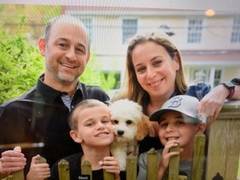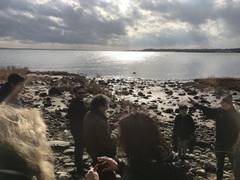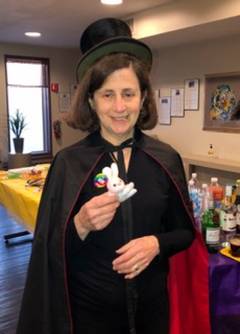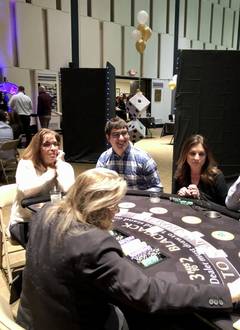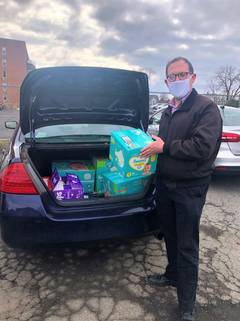Sh'lah L'kha 5779: True Colors
07/16/2019 03:28:09 PM
Jul16
| Author | |
| Date Added | |
| Automatically create summary | |
| Summary |
If you've made it in to the city at all in recent weeks, surely you noticed that many places have been festooned with rainbow flags, as was the lawn of our synagogue. June, as you may know, is Pride month, which celebrates the resilience of the LGBTQ community. This pride month is particularly important, as it commemorates 50 years since the Stonewall Riot. This event is widely considered as the catalyst of the gay rights movement. People from all over the world have come to New York this weekend to participate in the World Pride parade through lower Manhattan on Sunday.
Pride events continue to be held in order to counter the sense of shame and marginalization that many LGBTQ people experience. For those who have been told, implicitly and explicitly, that their identities and lives are at best unusual, and at worst a threat, Pride offers an opportunity to celebrate those who are otherwise pushed to the margins. Even as our society, laws, and culture have made great progress towards inclusion, identifying and living openly as a member of the LGBTQ community still requires courage and faith.
In our Torah portion this week, Sh'lach l'cha, we have a model of someone who exhibited that kind of courage, the courage to go against the crowd and express the truth as he understood it. In this Torah portion, Moses, at God's command, sends out 12 spies, one from each tribe, to scout out the Promised land. They are to report back on the qualities of the land and its inhabitants. One of those spies was a man named Caleb ben Yephunneh, from the tribe of Judah.
The spies explore the land and return to the wilderness with some of its wonders, including a cluster of grapes so big that two men had to carry it together.
The spies do tell the Israelites that the land is good, flowing with milk and honey. But they also arouse fear by talking about the people they perceive as giants who are already living there.
But Caleb ben Yefuneh defies the other spies. He implicitly acknowledges the challenges the other spies indicate, but encourages the people, and tells them that they will overcome those challenges to take possession of the land.
Despite Caleb's reassurance, the people panic. They even try to head back to Egypt rather than face the challenges ahead of them. Because of this lack of faith in God's protection, God decides that the generation of the wilderness will not cross into the land. Rather, the next generation, one perhaps more prepared to face the challenges of taking possession of the land and setting up their own society there, would enter instead.
So, Caleb failed in his attempt to calm the people and to get them to see their situation from a different, more faithful, perspective. But nonetheless, he and his fellow spy Joshua tried, at great personal risk. At one point the people even threaten to stone them to death, prevented only by Divine intervention. Caleb and Joshua receive a reward for their effortsâ€"of that entire generation, only they will actually enter the land of Israel.
Yet the question remains: why was Caleb brave in this way? Why did he speak up when the other spies succumbed to panic, fear, and group-think? What gave Caleb what the Torah describes as a ruach acheret, a different spirit, that enabled him to act different and go against the crowd?
The Talmud, in tractate Sotah, notes a grammatical oddity in this story. The Torah (Num. 13:22) says that the spies, in the plural, went up to the South of Israel, but then in the singular that he came to a city called Hevron. While the Torah sometimes refers to a group in the singular, the Talmud explains that this means that only one of the spies, Caleb, went to Hevron. In other words, during their tour of the land, Caleb broke off from the group to travel on his own.
What is the significance of Caleb's solo visit to Hevron? As you may recall, Hevron is the location of the graves of the ancestors, of Abraham, Sarah, Isaac, Rebecca, Jacob and Leah. So, the Talmud infers, Caleb broke away from the other spies in order to visit those tombs in Hevron. There, he prayed for the deceased ancestors to intercede on his behalf, to protect him from the plot of the spies.
Perhaps Caleb's prayers were answered. Perhaps visiting those graves reminded him why the people were journeying to the land in the first place. But in any event, his visit there inspired him to find that ruach acheret, that different spirit, within himself, and then to share it with others, even at the risk of his life.
So, Caleb for us is a model of the courage to be different, the courage to speak the truth as we understand it when the stakes are high.
This Pride month, we celebrate those in our community and beyond who have found their own different spirit within, and had the courage to give it voice. In particular, those whose different spirit involves who they love, or how they understand their gender, must overcome shame, misunderstanding, and discrimination in order to express themselves like Caleb did. I know from my own experience that it is not always an easy road. For every triumphant person marching in a Pride parade, there are many others suffering in silence.
Our ancestors could not make room for Caleb's different spirit. They could not attend to the truths that Caleb desperately needed them to understand. And our ancestors were so much worse off because of it. Their inability to hear and understand what he was saying cost them the opportunity to enter and live in the Promised Land.
Listening to those with a different spirit is no less urgent for us. This Pride month, we need to reaffirm our commitment to listening to those who experience the world differently, to those whose gender or sexuality pushes the limits of our comfort and familiarity. Not doing so will hold us back from our fullest potential, as it did our ancestors. As we enter this Shabbat, may we merit to appreciate everyone's truest colors.
Sat, November 1 2025
10 Cheshvan 5786
Photo Gallery
Photo Albums
Sat, November 1 2025 10 Cheshvan 5786
Upcoming Events
All Events
-
Wednesday ,
NovNovember 5 , 2025Rabbi, May I? Modern Responsa
Wednesday, Nov 5th 10:00a to 11:30a
Wednesdays, 10 - 11:30 AM, KTI Library Ever since Abraham’s famous argument with God, Judaism has been full of debate. Moses and Korah, David and Nathan, Hillel and Shammai, the Vilna Gaon and the Ba’al Shem Tov, Spinoza and the Amsterdam Rabbis . . . the list goes on. No wonder that Judaism cherishes the expression machloket l’shem shamayim, “an argument for the sake of heaven.” Beyond their historical importance, what makes these disputations so compelling is that nearly all of them, regardless of their epochs, are still being argued. The parade of characters spanning three millennia of biblical, rabbinic, and modern disputation reflects the panorama of Jewish history with its monumental political, ethical, and spiritual challenges. This series will examine Jewish responses to exile from the biblical period to our modern day. Considering texts from all genres of Jewish literary creativity, we will explore how the realities and iterpretaions Join as we re-open these timeless debates that lead us to the core of 3,000 years of Jewish conversation. • Justice: Abraham vs. God (October 19) • Holiness and Authority: Moses vs. Korah (November 9) • Inclusion: The Five Daughters vs. the Twelve Tribes (November 30) • Accountability and Morality: David vs. Nathan (December 21) • Resistance: Ben Zakkai vs. the Zealots (January 18) • Law: Hillel vs. Shammai (February 15) • Spirituality: The Vilna Gaon vs. the Baal Shem Tov (March 15) • Boundaries: Spinoza vs. the Amsterdam Rabbis (April 19) • Religious Evolution: Geiger vs. Hirsch vs. Frankel (May 10) • Zionism: Herzl vs. Wise (May 31) -
Thursday ,
NovNovember 6 , 2025Coffee with the Rabbi
Thursday, Nov 6th 8:00a to 9:00a
Start your morning with some caffeine and casual or meaningful conversation! Join Rabbi Goldberg for a Coffee Chat! Stop by Rye Ridge Starbucks any of the following Thursdays, between 8-9am: June 12 and 26 July 10 and 24 August 7 and 21 September 4 and 18 October 16 and 30 November 6 and 20 December 4 and 18 -
Thursday ,
NovNovember 6 , 2025Janet Heiser Game Night 2025
Thursday, Nov 6th 7:00p to 9:00p
Bring your friends for a night of Mah Jongg, Canasta, Bridge and prizes! Thursday, November 6th at 7:00pm KTI Social Hall $30 per person ($36 per person after Nov. 3) in memory of Janet Heiser, whose tireless effort helped to strengthen Jewish connections and continuity at KTI and the greater Jewish community Co-Chairs Pam Kaplow - pdougk@aol.com Laurie Landes - lrl52@aol.com -
Friday ,
NovNovember 14 , 2025Give Thanks at Tot Shabbat 2025
Friday, Nov 14th 5:30p to 6:30p
-
Tuesday ,
NovNovember 18 , 2025Women's Rosh Chodesh Group
Tuesday, Nov 18th 12:00p to 1:30p
New Women's Rosh Chodesh Group Tuesdays, 12:00-1:30pm Gather with Cantor Sklar and KTI friends at the start of each month of the Hebrew calendar to learn about the themes and traditions of the coming month. Learn from each other, learn more about each other and better understand the women within our tradition. Enjoy music and lunch together! Please a dairy or parve lunch to enjoy at noon, followed by the discussion at 12:30pm. KTI will provide drinks and dessert. RSVP Appreciated
Privacy Settings | Privacy Policy | Member Terms
©2025 All rights reserved. Find out more about ShulCloud

